Kennedy Scholars meet Rome International Scholars to discover the layered history of the city
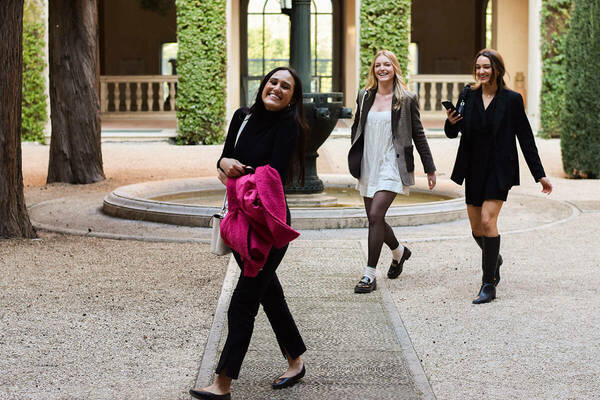
When Elizabeth Gonzalez first enrolled on the Kennedy Scholars Seminar in London, she was expecting to learn research skills to further her senior thesis. After spending a weekend visiting world class historical sites in Rome, meeting the Rome International Scholars, and even spending time with the US Ambassador to the Holy See, Gonzalez is amazed by what the class has taught her so far.
The Kennedy Scholars Program encourages students to discover resources that are available to them outside of the classroom and gives them a taste of what independent research is like. They are taken to libraries, archives and sites of interest, primarily in the UK. More recently however, the class has incorporated a trip to Rome, allowing students to gain a deeper appreciation of the interconnectedness of cultures, academic disciplines and historical periods. Perhaps even more valuable is the growing connection between London's Kennedy Scholars and the Rome International Scholars, allowing both groups of students an appreciation for the value of scholarly community.
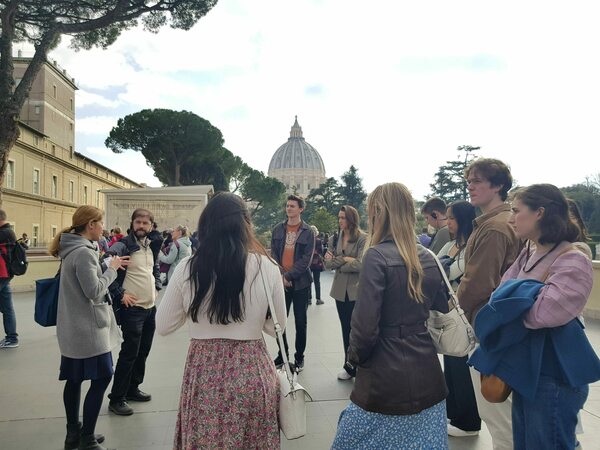
The Seminar is led by Rome native Professor Vittorio Montemaggi, Director of the Von Hügel Institute for Critical Catholic Inquiry at St Edmund’s College, Cambridge, and Alice Tyrell, Director for Academic Programs and Librarian at the London Global Gateway.
“The value of in-person experiences and primary sources has always been at the core of the Kennedy Scholars Seminar,” says Tyrell. “Rome offers the opportunity to add an international component to the Seminar that enhances this, and that is also integrally connected to Notre Dame's global network, which is invaluable,” adds Montemaggi.
On their visit to Rome, Kennedy Scholars had the opportunity to join and meet with the Rome International Scholars (RIS), led by Professor Chiara Sbordoni. The RIS program is an undergraduate program for a selected group of students who, during their time in Rome, pursue an independent research project with Notre Dame faculty supervision. They also take courses at local universities, live with Roman families, and carry out internships with local organizations.
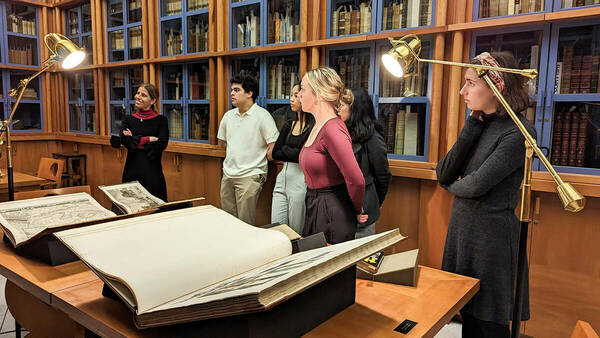
Gonzalez, who’s research project focuses on the migration selection theory of Latin American migrants to London, has found that the Kennedy Scholars Seminar, and the trip to Rome, has deepened her interest in research. In particular, she has begun to ask questions about who decides what is worthy of preservation, and how this shapes our understanding of the past.
“The Kennedy Scholars Seminar emphasizes the importance of archives and archivists”, says Gonzalez. “What is deemed worthy of preservation often defines how we view history, and that is very important when we decide what collections to look at.”
Although Gonzalez started to get a deeper understanding of this while studying and visiting sites in London, it became even clearer as she was examining the layers of history in Rome. On the first day of the trip they visited the Basilica of San Clemente, a church built in 1108 AD. Although known as one of the largest collections of Early Medieval wall paintings in Rome, it was what was hidden underneath the Basilica that really impressed Gonzalez.
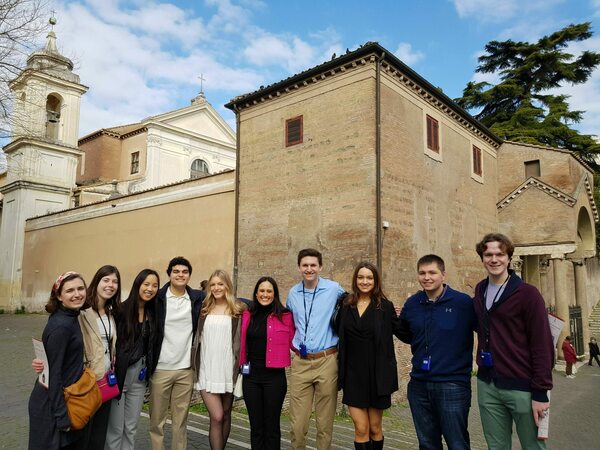
The church they saw from the street was built atop a 4th century church, which in turn was built atop 1st and 2nd century Roman buildings, including a Mithraeum. To the backdrop of running water from the underground river, Gonzalez was fascinated to discover a 1st century residence, a secret 3rd century pagan temple, and the Cloaca Maxima, the sewer system of ancient Rome.
“Our visit to the Basilica was a literal introduction to the theme of the week,” reflects Gonzalez. “You can see the foundations of the building were built from former Roman antiquity scraps, things that they deemed as unimportant. It really brought into focus that what we deemed unimportant back then has heavy cultural significance to the present. Preservation really affects how we see the present day.”
The history of the city is everywhere in Rome, with ruins and churches dating back 2000 years. However, both the Rome Scholars and the Kennedy Scholars are tasked to look further than the well-known historical sites.
“The encounter of the two classes of Notre Dame undergraduate scholars is centered around the idea of Rome as a site for research meant in scholarly terms,” comments Sbordoni. “It focuses on the variety of unique resources offered by the city. The first resource we consider is the very physical layering of Rome with its 30-century long history, which makes it visually clear that in order to understand Rome, it is necessary to go in depth. At the Basilica of Saint Clement, for example, it becomes apparent that Rome is a huge archaeological site.”
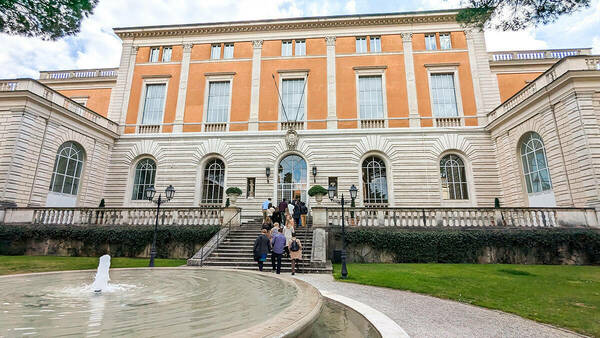
As well as San Clemente Basilica, the KS and RS students visited the American Academy in Rome, Villa Richardson, the residence of the US Ambassadors at the Holy See, St. Peter Necropoli and the Vatican Museums.“In Rome research, meant in a broad sense, is a theme in itself” reflects Sbordoni. “The Eternal City has been for millennia the destination of pilgrims, travelers, scholars. Each of these groups are drawn here by their own particular quest, whether spiritual, personal, academic, and this is the first thing that we discuss with our students.”
Both London and Rome offer outstanding opportunities for researchers, with innumerable archives, museums and historical sites, but also as living historical sites themselves. For Gonzalez, the Kennedy Scholars has not only improved her skills as a researcher, it has also given her a more global perspective on her work.
“The Kennedy Scholars Seminar has given me a space to understand how the Latin American community experiences life not only in the US, but in other countries across the world,” states Gonzalez.
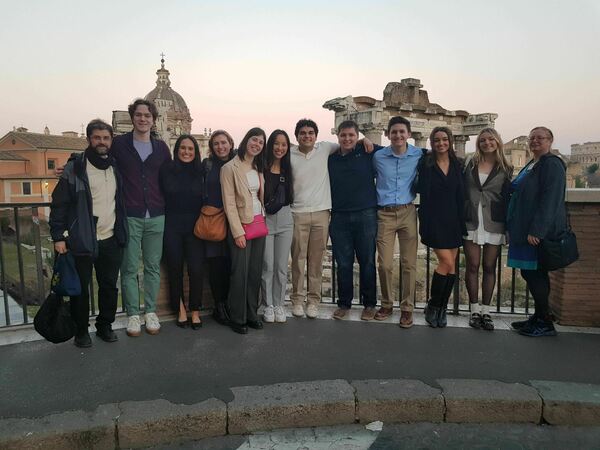
Gonzalez’s experience is representative of what Notre Dame seeks to do through extensive study abroad opportunities. By encouraging students to spend time abroad, the University pushes them to expand their understanding of different countries and cultures, giving them the opportunity to develop as global citizens. Through opportunities such as the Kennedy Scholars Seminar and the Rome Scholars Program, students are able to lead and take part in research that deepens their understanding of the world, and the role they can play within it. Through her studies, Gonzalez’s mind has been opened to new ways of thinking about her work and where it will take her.
“The Kennedy Scholars Seminar has taught me how, as researchers, what we look at and what we contribute is going to play a part in what is preserved in the future,” she reflects. “So I'm not only looking at it in terms of what I’m interested in but also what mark do I want to have on this world?”
Find out more about becoming a Kennedy Scholar or a Rome International Scholar.
Originally published by at london.nd.edu on March 09, 2023.